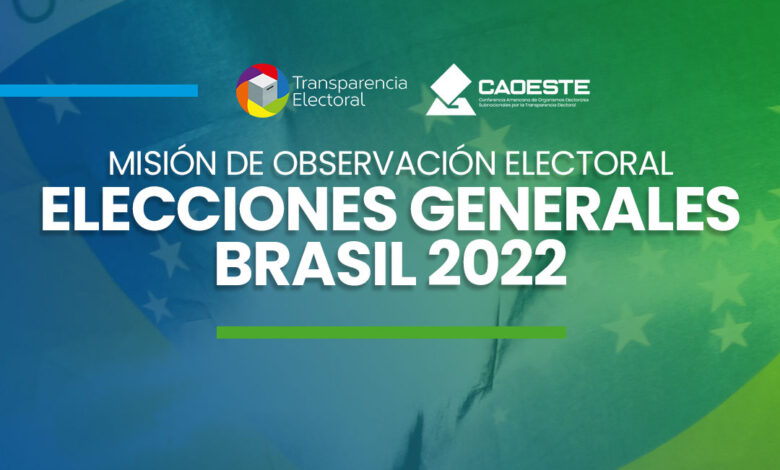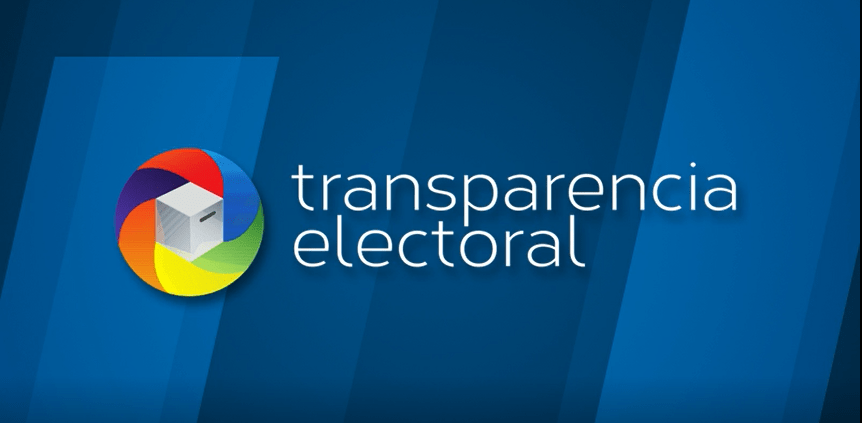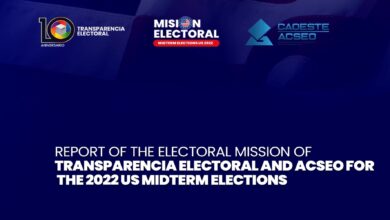Preliminary Report of the Election Observation Mission of Transparencia Electoral and ACSEO for Brazil’s General Election 2022

In a historic decision, the Superior Electoral Court of Brazil (TSE, by its acronym in Portuguese), through resolution 23,678 of December 17th, 2021, determined the conditions under which Election Observation Missions could be accredited and deployed in Brazil, a practice little implemented in previous years, with the most important precedent being the invitation of an Election Observation Mission from the Organization of American States (OAS) in 2018.
Transparencia Electoral and ACSEO have been monitoring the entire electoral process, and found that it is following the recommendations of the 2018 OAS Election Observation Mission that a public call was made for national organizations to enroll as observers. This resulted in the accreditation of 8 national entities, including higher education institutions, non-governmental organizations and civil society entities made up of officials from the Judicial Branch and others. The measure was published under Ordinance No. 651/2022 of the Superior Electoral Court, in compliance with article 11-I of Resolution No. 23,678/2021.
For Transparencia Electoral, the fact that citizens can observe the elections is a right and a form of accountability that, when used, improves and legitimizes the electoral process, therefore, the Mission welcomes what it hopes will be the beginning of a tradition that encourages the participation of international organizations and citizens in the form of election observation.
To start the work related to the deployment of international observers, Transparencia Electoral signed a procedural agreement with the Superior Electoral Court of Brazil, an understanding that accredited the organization to send observers to Brasilia, in a Short-Term Observation Mission, along with other organizations that also confirmed their participation such as the Organization of American States (OAS), the Inter-American Union of Election Organizations (UNIORE, by its acronym in Spanish), the Mercosur Parliament (PARLASUR) and the Community of Portuguese Language Countries (CPLP, by its acronym in Portuguese).
This is the first time in the history of Brazil that an international civil society organization is formally invited by the election entity to observe a federal election. Transparencia Electoral, together with the American Conference of Subnational Electoral Organizations for Election Transparency (ACSEO), was previously in Brazil to observe subnational electoral processes, for which it recently obtained an honorable mention.
The Global Network for Electoral Justice (GNEJ) awarded the effort of the International Observation Mission for the Complementary Elections of Petrolândia (Santa Catarina) in June 2021, specifically in the category “Concrete progress towards the main objectives of the GNEJ”, for the “Electoral Integrity Project in relation to the Brazilian municipal elections of June 2021” presented by the president of ACSEO, Dr. Marcelo Peregrino.
This is the context leading to September 29th, 2022, when Transparencia Electoral and CAOESTE began the deployment of the International Election Observation Mission, made up of observers from Argentina, Colombia, the United States, the Dominican Republic, Mexico, and Peru, and under the direction of Ann M. Ravel, former Commissioner of the United States Federal Elections Commission (FEC) and part of the Board of Experts of Transparencia Electoral. Also part of the Mission were Luis Miguel Santibáñez, Country Coordinator for Mexico of the organization; Marcelo Peregrino, Country Coordinator for Brazil and President of ACSEO; Felipe Carvajal, Director of the Electoral and Civil Status Training School (EFEC) of the Central Electoral Council of the Dominican Republic; and other regional election authorities from Argentina and Mexico.
Transparencia Electoral extends a recognition to the teams at the Superior Electoral Court and regional entities for the work carried out, and hopes that it will continue to strengthen technological innovation and national and international citizen participation through in form of election observation.
BEFORE VOTING DAY
Countering disinformation
In March of this year, the then president of the Superior Electoral Court of Brazil, Minister Luiz Edson Fachin, in use of his respective attributions, resolved to set up the “National Front to Fight Disinformation – FRENTE”, made up of authorities, public servants and volunteer collaborators, with the purpose of directing actions and events aimed at defending and reinforcing the credibility of electoral institutions in the eyes of Brazilian society.
The activities related to the National Front to Fight Disinformation would be coordinated by an Executive Committee, under the supervision and guidance of the Special Advisory Office for the Fight against Disinformation of the Superior Electoral Court (AEED), made up of 10 members appointed by the Presidency of the TSE, respecting the criteria of gender parity and regional representativeness.
ACSEO members were involved in this initiative: Frederico Rafael Almeida, Elder Maia Goltzman and Volgane Oliveira Carvalho, elected as representatives of the South, North and Northeast regions respectively.
The Mission recognizes the efforts made by the Superior Electoral Court in the fight against disinformation, and congratulates the agency for its permanent program to fight disinformation, one of the winners of the first edition of the Global Electoral Justice Network Awards, in the category Election Authorities in Emergency Situations. According to the organization of the award, the TSE understood the risks of election disinformation, including its impact on the public’s trust in Institutions.
Agenda prior to Election Day
On September 29th, the day its deployment began, the Mission was received by the Vice Governor of the Federal District of Brasilia, Marcus Vinicius Britto de Albuquerque Dias, at the Official Residence. The members of the Mission learned exactly about the work that the Vice Governor’s office carries out during the electoral process. Then, the members were received by Counselor Márcio Michel, of the Court of Accounts of the Federal District, the entity that regulates and controls everything related to political financing in the jurisdiction of the Brazilian capital.
During the afternoon, the observers held working meetings with different areas and secretariats at the headquarters of the Superior Electoral Court (TSE) of Brazil, among them, the areas of Electoral Management, the Examination of Campaign Finances, and Information Technology. In addition, the Election Observation Missions of Transparencia Electoral and the Inter-American Union of Electoral Organizations (UNIORE), held a meeting in which the Heads of Mission, Ann Ravel (Transparencia Electoral) and Lorenzo Córdova Vianello (UNIORE), President of the Institute National Electoral Commission of Mexico, exchanged perspectives of the electoral process.
At the beginning of the day on Friday, September 30th, the members of the Mission were received by institutional authorities and representatives in the Legislative Chamber of the Federal District, and by the heads of the Regional Electoral Court of the Federal District (TRE-DF), including its President, Dr. Roberval Casemiro Belinati, an opportunity in which the observers were able to clarify the role of the Regional Court in the administration and control of the electoral process.
Around noon, the Mission was received by the Ambassador of the Dominican Republic in Brazil, Patricia Selma Villegas García, from where they went to the headquarters of the Brazilian Bar Association (OAB) to meet with the President of the Association, Beto Simonetti, and the National President of the Electoral Commission of the Bar, Sidney Neves.
Subsequently, delegations from the Electoral Observation Missions of Transparencia Electoral and the Organization of American States (OAS) held a meeting in which the Chiefs of Mission were able to exchange views on the Brazilian electoral system and the ongoing election. Ann Ravel, Chief of Mission for Transparencia Electoral, and the Former Foreign Minister of Paraguay Rubén Ramírez, Head of the Mission of the Organization of American States (OAS), discussed the observation tasks of both deployments during the General Election.
On Saturday, October 1st, one day before election day, the Mission held a meeting with Minister Sérgio Silveira Banhos, one of the principal magistrates of the Superior Electoral Court of Brazil.
ELECTION DAY
Deployment on the field
The observers visited the polling stations of Asa Sul de Brasília and three of the Administrative Regions of the Federal District: Guará, Aguas Claras and Ceilândia, where the use of biometric voter verification was observed.
Regarding the training of the polling station authorities (mesários and mesárias), the observers indicated in 69.8% of cases that their performance was very positive (5) and positive in 25.6% (4) of them. On the other hand, in 65.1% of the polling stations observed, they evaluated very positively (5) the distribution of ballot boxes (an indicator related to the ease of movement in the polling stations) and in 20.9% of the cases, they gave a positive score (4).
Other aspects of Election Day
In other aspects, such as ease of access to polling stations, only in 11.6% of cases was any difficulty identified, in 74.4% the authorities attended to fulfill their assigned role and in 74.4% it was considered that the polling station authorities received sufficient training. As an aspect to improve in the second round, long lines to vote were identified in 58.14% of the stations observed.
Contingencies
On two occasions, the observers witnessed technical problems with the electronic ballot boxes and biometric verification that delayed the process in some stations, events that were promptly resolved by the authorities.
According to official information handled by the Mission and the general public, the Superior Electoral Court and the regional entities activated contingency protocols for the replacement of 3,222 electronic ballot boxes, which represented:
- 0.7% of the ballot boxes deployed for voting (472,075)
- 3.1% of the electronic ballot box contingency reserve (105,050)
In both cases, it is important to point out that it was a small portion of the ballot boxes available to the electoral organization.
The Mission, as one of a few other Technical Missions deployed in Brasilia for this electoral process, highlights that it sees the Brazilian electoral system and the electronic ballot boxes as an example of good electoral practices, a perception that was further increased by verifying the openness of the Superior Electoral Court towards the more than 25 observers accredited by this Mission, with regard to access to information on important aspects of the electoral system and the administration of the ongoing process.
The Ministry of Justice and Public Security of Brazil, through what they called “Operation Elections 2022”, up to 4:22 p.m. on election day registered 939 electoral infractions, mainly related to the buying of votes, and 307 arrests related to some violation of election day regulations. The Mission considers that, in an electoral process with a universe of more than 156 million voters, this represents a calm and civic day, without major eventualities or contingencies to report.
Election results
The Mission independently monitored the upload of data for the provisional results and recorded that at 8:00 p.m., 3 hours after the official closing of the polling stations (5:00 p.m.), 70% of results had already been uploaded and published, and by 8:40 p.m., 90% of the load was exceeded, thus offering an important level of certainty to citizens in this transcendental electoral process for Brazil. In addition, the election authority successfully faced the technical challenge of loading 472,075 voting stations (electronic ballot boxes) in a timely manner.
The official results reveal a serious problem involving opinion pollsters and the media coverage. The Mission released a statement addressing this concern so that, facing the runoff election on October 30th, these two important actors act responsibly. The use of social research tools, such as opinion polls, aimed at manipulating the public conversation, is an unacceptable practice in democracy. Given these circumstances, the speed with which the results were published guarantees high levels of certainty.
RECOMMENDATIONS
The Mission will share observations and make specific recommendations to the Superior Electoral Court in its final report regarding all the aspects evaluated according to the methodology designed for this deployment, including but not limited to: the layout of the tables in the polling stations, the voting instruments, the accessibility of polling stations for voters with special needs, the operation of biometric authentication points, and the presence and performance of polling station authorities (mesários and mesárias).



